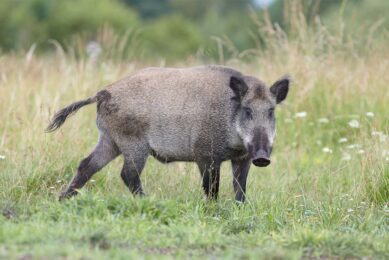Spain is Europe’s top pig meat exporter to China

In 2020, Spain came out as Europe’s number 1 pig meat exporter to China. That figure, and many others, were shared by Markus Fiebelkorn, Danish market analyst at a presentation at the digital EuroTier, sharing many interesting insights in Europe’s pig production.
Fiebelkorn, market analyst with Danske Svineproducenter (Danish Pig Producers), gave his presentation on Thursday, February 11. He started by explaining that China – even in times of African Swine Fever (ASF) – remains the top pig producer in the world with an estimated 38 million tonnes of pork produced in 2020. That figure fell from 54 million tonnes in 2018 largely due to ASF outbreaks, but production is estimated to climb there to 43.5 million tonnes in 2021.
Compare that to the European Union which is the 2nd largest pork producer in the world, and the total production there over the past 3 years has stayed steady at 24 million tonnes. Other nations such as the USA, Russia and Brazil continued to expand over the last 3 years as demand increases all over the world.
Spain trebles pork shipments to China
One of the biggest players exporting pork to China is Spain, which exported 933,940 tonnes of pork there in 2020. That was actually almost 3 times more than it exported to China in 2019 with 381,629 tonnes, Fiebelkorn said. The USA exported 696,086 tonnes of pork during 2020 and Germany exported 462,346 tonnes.
The strong growth of Spain’s exports is not only related to an ASF-related deficit of pork in China. The figures likely accelerated due to outbreaks of ASF in Germany’s wild boar population since September 2020. Ever since, for Germany exports to 3rd countries outside the EU have been impossible, hence others stepped in.
Germany has been urging for a deal of regionalisation, i.e. that pork from not-affected German states would be allowed to be admitted. Fiebelkorn commented, “When you look at what the deficit was in Chinese consumption in 2019, Germany is only covering less than 1% of that. Germany is actually not a big player in producing pork for China and therefore I am so sceptical that it will get an agreement with China.”
Spain: A big grower in pig production
The EU pig herd in 2020 showed that Spain had expanded its herd size to 31.3 million pigs, which was a 3% increase from 2019. Germany had 25.5 million pigs in 2020 which showed a 1.8% drop since 2019. France and Denmark stayed around the 13 million pigs number but Netherlands had dropped from 12.2 million to 11.4 million due to its government directive to reduce pig production there.
Pork consumption figures
He also took a look at the consumption figures during his presentation at EuroTier. China consumed 43 million tonnes in 2020 while the EU consumed 19.7 million tonnes in the same year. Fiebelkorn said: “In the EU, while pork production has expanded, consumption has actually decreased. This means that we need to export part of our production to 3rd countries. This has an impact on the different countries in the EU as some countries have easier access to the Chinese market while others are still having problems with ASF.”
Forecast for EU pork production
The EU27 forecast for pork production shows clearly that its net production will hover around 22 million tonnes until 2030. However, the consumption per inhabitant is set to drop from 34.5kg per person in 2018 to 31.9kg per person in 2030.
Fiebelkorn said: “The EU exports of pork will remain steady at around 4 million tonnes to 2030 and the EU expects it can export pork to China, to Asia, even when China gets back to its former production levels it had in 2018.”
Cost of production: US and Brazil
When it comes to cost of production Fiebelkorn said it is tough for European countries to compete with the US and Brazil who can produce pork for around € 1/kg.
In Europe, Denmark and Spain have the lowest costs of production in 2018 of € 1.39/kg while France, Belgium and the Netherlands hovered around the € 1.45 to 1.50/kg mark. Germany, UK, Sweden and Ireland range from € 1.60 to 1.67/kg while Italy has the highest cost of production at € 1.88/kg.

Rabobank: Pork supplies to grow again in 2021
Considering prices, Fiebelkorn said: “I think the situation we are in now is very similar to 2018 when we had the ASF outbreak in Belgium. Prices are climbing steadily again now but won’t climb as sharply as it did back then.”
Differing pork prices in Europe
Prices now differ across Europe but in Spain are € 1.489/kg, in Denmark are € 1.465/kg, while in Germany are € 1.136/kg, to give a few examples. “This represents a 30% price difference between Germany and Denmark but that is probably down to there being a lot of slaughter pigs on the German market at present,” said Fiebelkorn.
 Beheer
Beheer









 WP Admin
WP Admin  Bewerk bericht
Bewerk bericht